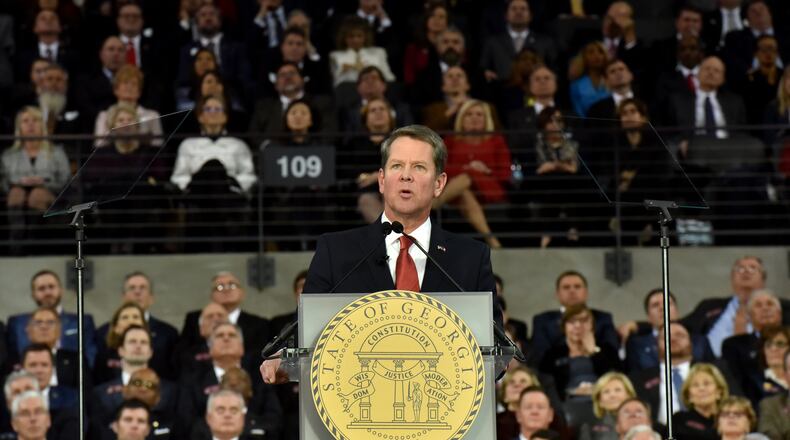Gov. Brian Kemp will include $1 million in his budget to develop a waiver that he said would give the state more flexibility to use federal Medicaid dollars, an idea he indicated was promoted by former Health Secretary Tom Price.
The Republican, who has long opposed Medicaid expansion, said on WSB's The Erick Erickson Show that he would outline the plan Thursday in his State of the State address to take a "first step to start moving the needle" on healthcare.
Kemp quickly brought up Price, who he said “knows about how these processes work to get approvals through the executive branch in D.C. to allow you to do some innovative things.”
“We believe this money we’re looking at funding will give us opportunities to figure those things out,” Kemp told Erickson. “This is absolutely an issue we’ve got to work with the Legislature on, and I’m looking forward to doing that.”
It's not immediately clear if Price, a former Georgia congressman who resigned in 2017 amid criticism of his extensive use of taxpayer-funded charter flights, will be directly involved in pursuing the waiver. Price, a Roswell orthopedic surgeon, served on Kemp's transition team.
In his campaign against Stacey Abrams, Kemp supported a broad Affordable Care Act waiver to help stabilize insurance premiums. But he never specifically backed a waiver to the Medicaid program, an idea former Gov. Nathan Deal's administration explored but never embraced.
Kemp and other leading Republicans say the estimated cost of expanding Medicaid — which analysts say could eventually range from $246 million to $468 million a year — would be too pricey in the long run.
A Medicaid waiver, if approved by the federal government, could expand Medicaid coverage in a more tailored way. Some conservatives, for example, have promoted using waivers to include a work requirement for certain recipients.
A growing number of Georgia Republicans back Medicaid waivers, and some call for all-out expansion. Democrats, including Abrams, argue that Medicaid expansion is essential to spur economic growth and help cover 500,000 uninsured residents.
On the campaign trail, Kemp said he backed a waiver modeled after a Wisconsin program that was recently approved by federal regulators. That five-year waiver would create a $200 million reinsurance program to stabilize premiums and protect residents with pre-existing conditions.
Georgia lawmakers in 2014 passed legislation that gives the Legislature the final say over any expansion to the Medicaid program. Provisions were included in several subsequent budget plans allowing the state to pursue a specialized Medicaid waiver, but no action was taken.
Georgia also flirted with a wide-ranging waiver in 2015 under President Barack Obama's administration that would have sought more Medicaid money to help struggling rural hospitals and its big "safety net" facilities like Grady Memorial in Atlanta. But the state later quietly abandoned those discussions.
Kemp's speech is set for 11 a.m. on Thursday. Here are some other takeaways from Erickson's interview with Kemp, which aired Wednesday evening.
On his choice of the Bible verse in his swearing-in ceremony, Proverbs 16:7, which reads: “When a man’s ways please the Lord, he makes even his enemies be at peace with him.”
“It’s my charge. I said in the speech, I’m going to be fighting for all Georgians – not just the ones that voted for me. I’m going to make sure my enemies, and people that maybe didn’t vote for me - I’m going to be fighting for them as the 83rd governor.”
On whether he can govern in a bipartisan manner:
“As many bad things as (Democratic chair) DuBose Porter has said about me, he has experienced me working across the aisle ... I’m looking forward to proving my critics wrong. It doesn’t mean I’m going to run from my positions or my principles. But it means I will work with issues that matter to the people of Georgia.”
On the debate over loosening the certificate of need law, which requires the state to determine whether there’s a need for hospital and healthcare expansions:
“It’s a discussion we need to have. It’s a very, very serious issue. I know there are strong feelings on both sides of that. So I’m in the posture right now where we’re going to go through the legislative process and really get educated and see what is the best thing for us to do going forward.
“But I know this: Our system, costs keep rising and it’s killing hardworking Georgians. I’m open to innovation and to different ways of doing things. The status quo is not working, and I’m looking forward to us tackling that issue.”
About the Author
Keep Reading
The Latest
Featured




